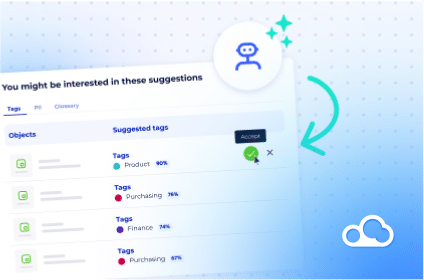As a data-driven professional, you are likely well-versed in data lineage. However, the concept of data catalogs may be less familiar. Data catalogs offer a powerful solution for managing and organizing your organization’s data assets, ensuring that you can quickly discover the most relevant data for business and analytical purposes.
What is a data catalog?
A data catalog is a sophisticated tool that leverages metadata to create a searchable, informative inventory of an organization’s data assets. Metadata serves to summarize and describe data, enabling efficient organization and access. Data catalogs encompass a wide range of data assets, such as:
- Database connections
- Machine learning models
- Data visualizations and dashboards
- Reports and query results
- Unstructured data (e.g., video, audio, images, mobile data, social media content, email, webpages, and documents)
- Structured data (tabular)
Utilizing a catalog, you can achieve the following:
- Govern data in accordance with government or industry regulations
- Automate the discovery of relevant data, even if not explicitly searched for
- Conduct searches within the catalog
Selecting the right data catalog software
When evaluating data solutions, consider the following essential capabilities:
- Simplified compliance management
- Enhanced data discovery and user experience
- Support for data governance and quality assurance
- Wide variety of data source connections
- Explainable AI support
The importance of a data catalog for your business
Data catalog software empowers data professionals to access the data they need independently while mitigating concerns related to:
- Compliance and governance
- Relying solely on familiar assets
- Seeking colleagues or experts for guidance
- IT intervention
The benefits of implementing a data catalog
Implementing data catalog software provides numerous advantages that contribute to your business’s overall success:
- Competitive advantage through improved and expedited data analysis: The software enables more accurate results and effortless searching for relevant information
- Overcoming business and technical challenges: Data catalogs facilitate the attainment of specific business and technical objectives. Analysts can leverage a comprehensive, single view of customers to uncover new opportunities for targeted promotions, up-selling, cross-selling, and more
- Risk reduction through better-informed decision-making: Data catalogs offer analytics that enable executives to make critical decisions, resulting in robust strategies and minimized risks
- Enhanced regulatory compliance: Data catalogs support data governance implementation by simplifying, promoting, or automating governance, preventing data swamps, and providing a policy framework for AI model deployment, focusing on accountability, fairness, transparency, and safety
- Improved productivity and overall efficiency: By reducing time spent tracing and searching for data, your day-to-day productivity will increase, allowing you to focus on other aspects of your business.
Conclusion
In summary, data catalogs offer a powerful and comprehensive solution for managing your organization’s data assets. By implementing this solution, you can streamline data discovery, enhance decision-making, increase regulatory compliance, and improve productivity, ultimately contributing to your business’s success.
Still have questions about data catalogs? Turn to DataGalaxy to create your company’s data lineage mapping, develop a standardized business glossary, and much more! Check our calendar and select a date that works for you. Jumpstart your free 15-day platform trial access & start making the most of your data today!





